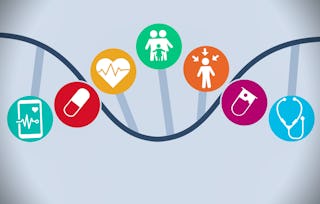Learn how advances in biomedicine hold the potential to revolutionize drug development, drug treatments, and disease prevention: where are we now, and what does the future hold? This course will present short primers in genetics and mechanisms underlying variability in drug responses. A series of case studies will be used to illustrate principles of how genetics are being brought to bear on refining diagnoses and on personalizing treatment in rare and common diseases. The ethical and operational issues around how to implement large scale genomic sequencing in clinical practice will be addressed.

Case Studies in Personalized Medicine

Case Studies in Personalized Medicine

Instructor: Dan Roden, M.D.
35,676 already enrolled
Included with
506 reviews
Skills you'll gain
Details to know

Add to your LinkedIn profile
See how employees at top companies are mastering in-demand skills

There are 6 modules in this course
The first module of this course will focus on introducing the concept of personalized medicine. We will very briefly review fundamentals of genetics as these apply to personalized medicine (DNA structure; RNA; protein structures; function of DNA; coding; DNA variations; types of genetic variants), as well as review statistical concepts and skills important to clinical data analysis (odds ratios, relative risk, P values, multiple testing, sensitivity, specificity, ROCs). In Module 2 we will explore drug actions and reactions as we look closely at the general mechanisms underlying variability in drug responses, drug metabolism and transport, and genetic variability in drug-handling molecules.
What's included
11 videos1 reading1 assignment5 discussion prompts
Module 3 focuses on how we study genetic variation. We'll start by looking at families and populations. Topics that will be introduced include family history and inheritance patterns, ancestry, and linkage. Then in Module 4 we shift our focus to studying the contemporary techniques and technologies used to study genetic variation, including genome-wide association and sequencing.
What's included
7 videos1 assignment4 discussion prompts
In Module 5 we will begin to discuss specific cases as these apply to personalized medicine. We will first look very closely at a case of familial hypercholesterolemia as we investigate how we use genomic medicine to move from a rare disease to a common medication, using genomics to find new drug targets, and a discussion of the side effects of statin therapy. In Module 6 we will look at a collection of "high risk pharmacogenetics"cases that illustrate adverse reactions due to drug metabolism and variable drug responses.
What's included
13 videos1 assignment4 discussion prompts
Module 7 continues our focus on case studies with a look at some cases that illustrate how personalized medicine informs treatment decisions related to specific diseases/conditions. These include cystic fibrosis, Marfan syndrome, heart failure, neuropsychiatric diseases, and diabetes. Three cases/lessons focus specifically on how genomic medicine informs testing for and treatment of cancer.
What's included
9 videos1 assignment4 discussion prompts
Module 8 serves as a review and a continuing discussion of the cases presented in Modules 5-7, as we take a look at where we are now and what's on the horizon in personalized medicine. In Module 9 we will explore some critical considerations for implementing and operationalizing personalized medicine in a system of care, particularly in the area of informatics. We will discuss the role of the electronic medical record in a learning healthcare system, how electronic records support discovery, and using electronic records in the delivery of personalized medicine.
What's included
9 videos1 assignment3 discussion prompts
We are on the verge of having patients come to their physicians with their entire genome sequenced. How can we best use this information to improve care? This course looks closely at many specific genetic variants that have been identified as playing a role in a person’s susceptibility to disease and/or potential for adverse reaction to certain substances/drugs. In the peer review activity below, please reflect on how your learning in this course has impacted your understanding of personalized medicine. There are two versions of this activity – one for healthcare professionals (doctors, nurses, pharmacists, medical students, etc.), and one for non-healthcare professionals (patients, consumers, general interest, etc.) Please be sure to choose the appropriate version of the activity.
What's included
2 peer reviews
Instructor

Offered by
Explore more from Patient Care
 Status: Preview
Status: PreviewUniversity of Geneva
 Status: Preview
Status: PreviewUniversity of Copenhagen
 Status: Preview
Status: PreviewThe State University of New York
 Status: Preview
Status: PreviewAmerican Museum of Natural History
Why people choose Coursera for their career

Felipe M.

Jennifer J.

Larry W.

Chaitanya A.
Learner reviews
- 5 stars
84.02%
- 4 stars
14.39%
- 3 stars
1.18%
- 2 stars
0.19%
- 1 star
0.19%
Showing 3 of 506
Reviewed on Nov 21, 2016
It was a great course and so much information. I would surely like to get more knowledge and insight of the topic discussed.
Reviewed on Feb 14, 2016
very informative course at advanced level and also taps the basics required to understand the advanced concepts wherever necessary.
Reviewed on May 30, 2020
It's very very very useful course and very interesting. I really gained and learnt many things which are very important and now I am very happy to learn.

Open new doors with Coursera Plus
Unlimited access to 10,000+ world-class courses, hands-on projects, and job-ready certificate programs - all included in your subscription
Advance your career with an online degree
Earn a degree from world-class universities - 100% online
Join over 3,400 global companies that choose Coursera for Business
Upskill your employees to excel in the digital economy
Frequently asked questions
To access the course materials, assignments and to earn a Certificate, you will need to purchase the Certificate experience when you enroll in a course. You can try a Free Trial instead, or apply for Financial Aid. The course may offer 'Full Course, No Certificate' instead. This option lets you see all course materials, submit required assessments, and get a final grade. This also means that you will not be able to purchase a Certificate experience.
When you purchase a Certificate you get access to all course materials, including graded assignments. Upon completing the course, your electronic Certificate will be added to your Accomplishments page - from there, you can print your Certificate or add it to your LinkedIn profile.
Yes. In select learning programs, you can apply for financial aid or a scholarship if you can’t afford the enrollment fee. If fin aid or scholarship is available for your learning program selection, you’ll find a link to apply on the description page.
More questions
Financial aid available,
¹ Some assignments in this course are AI-graded. For these assignments, your data will be used in accordance with Coursera's Privacy Notice.

